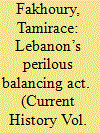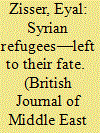|
|
|
Sort Order |
|
|
|
Items / Page
|
|
|
|
|
|
|
| Srl | Item |
| 1 |
ID:
142147


|
|
|
|
|
| Summary/Abstract |
Although its dysfunctional governance patterns predate the recent wave of turmoil in the region, the war in Syria has unsettled Lebanon’s precarious equilibrium.
|
|
|
|
|
|
|
|
|
|
|
|
|
|
|
|
| 2 |
ID:
164813


|
|
|
|
|
| Summary/Abstract |
The war in Syria led to one of the worst refugee crises experienced by the Middle East in recent decades. Its scope is unprecedented and has far-reaching implications not only for Syria or what remains of it, but for the receiving countries as well. In some cases, such as Lebanon or Jordan, the mass of newcomers may have an unsettling and disruptive effect on the demography of their host country. Syrian Refugees who found shelter in neighbouring countries may be able to return home or, alternatively, they may be able to be absorbed relatively easily in their current places of residence. With regard to the refugees in Europe, it is doubtful that they will ever return to their homeland, and, in any case, the Syrian regime is not at all interested in their return. Thus, for many more years even after the war in Syria ends, the problem of the refugees will undoubtedly remain complex, unresolved and an enduring burden on the host countries.
|
|
|
|
|
|
|
|
|
|
|
|
|
|
|
|
| 3 |
ID:
159374


|
|
|
|
|
| Summary/Abstract |
This article examines whether New Delhi’s engagement with the ongoing conflict in Syria (and Iraq) demonstrates that India is leaving behind its traditionally cautious and risk-averse foreign policy stance and becoming a more proactive international actor. India has not engaged actively with and has not tried to wield substantial influence over the course of this conflict; instead, after a moderate burst of diplomatic activity in the second half of 2011 India has largely tried to avoid involvement. There are some indications that India is trying to become more proactive in its region, in trade diplomacy, and toward a rising China; yet, results sometimes fail to meet ambitions. Accordingly, the article concludes that, on balance, India’s foreign policy orientation has not yet changed significantly; it remains a cautious, reactive international actor unwilling to engage with and actively shape the outcome of crucial crises or conflicts.
|
|
|
|
|
|
|
|
|
|
|
|
|
|
|
|
| 4 |
ID:
134748


|
|
|
|
|
| Summary/Abstract |
This article explores the experience of the Great War in Syria and Lebanon with a specific focus on the famine that, combined with other wartime calamities, decimated the civilian population. Using food as its primary register, it looks at a wide range of largely untapped Syrian and Lebanese poems, zajal, plays, novels, memoirs, and histories written over the course of the 20th century, in order to illuminate the experiential dimensions of the civilians’ war and to delineate some of the discourses that structured it. More specifically, it argues that the wartime famine in Syria and Lebanon gave rise to a remembered cuisine of desperation that is deeply informative about the ruptured world of the civilians’ war.
|
|
|
|
|
|
|
|
|
|
|
|
|
|
|
|
|
|
|
|
|